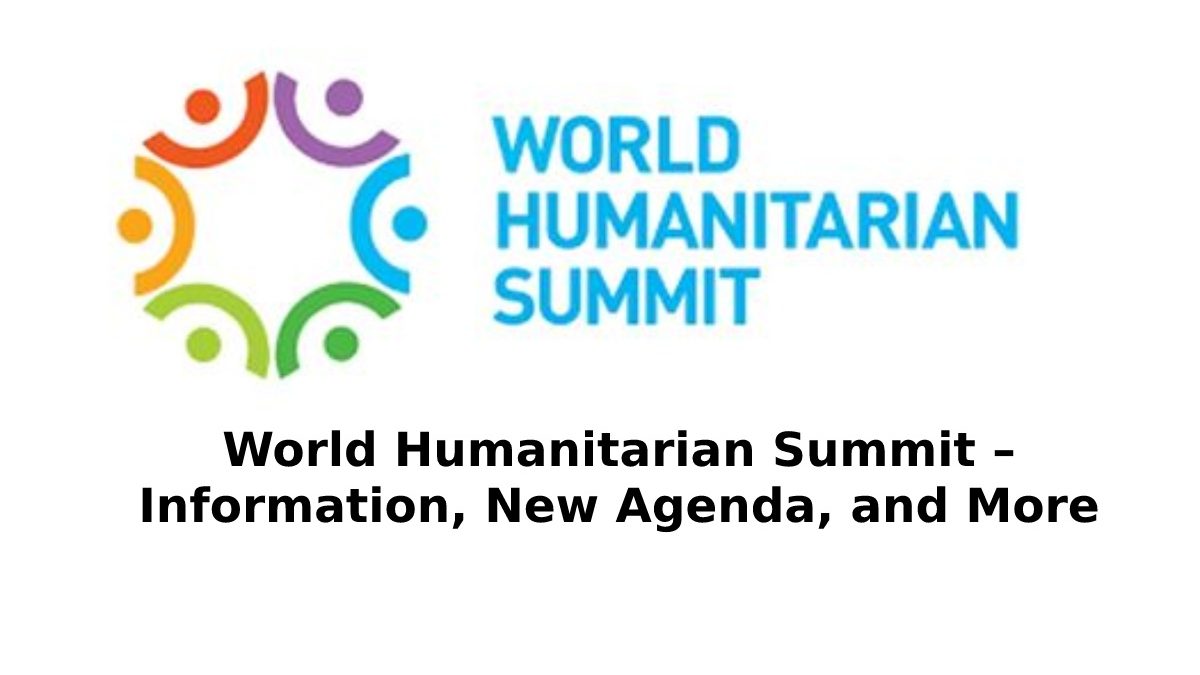Table of Contents
Basic Information
World Humanitarian Summit – The world is going through a critical moment. We are witnessing the most significant degree of human suffering since World War II. For this reason, for the first time in the 70-year history of the United Nations. Its Secretary-General Ban Ki-moon has convened the World Humanitarian Summit. Now is the time to unite about our common humanity and take action on a global scale to end the suffering of millions of women, men, and children affected by conflict and disasters.
Humanity – shared Responsibility
In 2016, more than 125 billion women, men, and kids worldwide needed humanitarian assistance. We haven’t seen so many people forced from their homes since World War II: more than 60 million people, half of whom are children. Moreover, the human and economic cost of disasters rises, and the impact of climate change accentuates; the frequency and severity of catastrophes project to increase.
The World Humanitarian Summit to seized in Istanbul on May 23-24, 2016, will mark a significant shift in how the international community prevents human suffering through crisis preparedness and response. At the Summit, world leaders must live up to their responsibilities to the world’s population by committing to advance the Secretary-General’s Agenda for Humanity, which charts a change course.
A New Agenda for Humanity
The Secretary-General’s call for change is part of a three-year consultation process that reached more than 23,000 people from 153 countries. Accordingly, the Secretary-General has called on world leaders from all sectors of government and society to shoulder five core responsibilities:
- Prevent conflicts and end them
- Respect the rules of war
- leave no one behind
- Work differently to end needs
- invest in humanity
The Agenda for Humanity sets out the critical actions needed to fulfil the five core responsibilities. Putting them into practice constitutes a moral imperative and a strategic necessity to face today’s global challenges.
Istanbul – From Vision To Action

In 2015, world leaders showed that we could tackle global challenges. They fixed on new frameworks for disaster risk reduction and financing for development, adopted landmark Sustainable Development Goals and reached a landmark climate agreement
In 2016, we faced building on this momentum and implementing measures to ensure that no single is left late. At the Creation Humanitarian Summit, the Secretary-General will call on the world and local leaders to commit to collective action and deliver on the Agenda for Humanity.
We all must play our part in fulfilling the Agenda for Humanity. For this reason, the Summit will bring together leaders from governments, businesses, international and regional organizations, humanitarian organizations, first responders, community networks, academia and civil society.
By working together, we can make a big difference in how the international community prevents human suffering through crisis preparedness and response. We can ensure that the Summit is a starting point for ensuring that humanity – security, the dignity and the right to prosper of the population – occupies a central position in decision-making on a global scale.
World Humanitarian Summit – protection of journalists
A call to protect journalists and promote independent journalism in crises was launched today by government representatives, United Nations agencies. The media and NGOs gathered in a session co-organized by UNESCO and the Secretariat of the World Humanitarian Summit.
The session was attentive to the challenges facing the media in crises. Especially the increased risk they face from journalists and their impact on their ability to do their jobs.
“Today, we must accelerate the process so that States recognize the importance of protecting the safety of journalists everywhere. Especially during humanitarian emergencies where they play an important role in informing, preventing, mitigating and reducing the impact of crises,” said Irina Bokova. Director-General of UNESCO.
In the same mood, the director of the Turkish newspaper Hurriyat and the president of this session, Vuelta Dogan Satanic, stated that “humanity is facing one of its most significant tests, where millions of people are leaving their homes for safety. The media plays a vital role, turning the world’s attention to the refugee crisis, giving voice to the suffering of refugees who force to leave their homes and imprinting their portraits on our consciences”.
Member States
The participants called on the Member States, United Nations agencies and the media to implement the UN Plan of Action on the Safety of Journalists and the Issue of Impunity. In addition. Specific actions discuss so that each entity involved increases. Its efforts to end attacks against journalists and promote independent reporting in crises.
In this way, the Member States order to create national security mechanisms for journalists. To prevent and monitor threats against communications professionals, end impunity by ensuring that crimes are investigated. And provide protection based on the formation of security forces and judicial agents around human rights. Humanitarian laws and the role of journalists. Furthermore, everything. Within the framework of the 2030 Sustainable Development Goals (SDG), in particular goal 16. Calls on States to “ensure public access to information and protect fundamental freedoms.”
Likewise, United Nations agencies urged to continue sharing information and improve practice. Using their expertise to implement the UN Plan around the world and monitor the safety of journalists. Through the Universal Periodic Review (Observation Mechanism of the situation of human rights in the Member States of the United Nations). UNESCO Reports, and progress reports on the implementation of the SDGs.
Finally. The media urged to ensure that their international and local staff and freelancers have the necessary training and resources to practice their profession safely.
UNESCO, a UN agency whose mission is to promote freedom of expression. Has reported that more than 825 journalists have slain in conflict zones over the last ten years. In other words, a communications worker is slew every five days. Moreover, in nine out of ten cases, those accountable never convict, which translates into absolute impunity in crimes against journalists.

